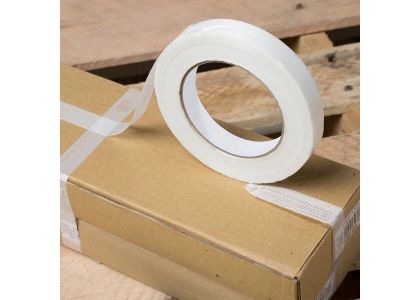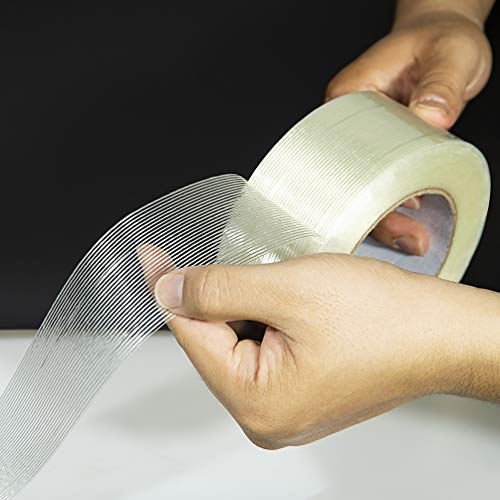
In the packaging and shipping industries, strapping tape plays a crucial role in securing packages and ensuring they remain intact during transit. Among the various types of strapping tape available, fiberglass strapping tape stands out due to its exceptional strength and durability. This post will delve into the composition of fiberglass strapping tape, exploring what it’s made of and how it compares to other types of strapping tape, such as scotch packaging tape, customized packaging tape, and paper packaging tape. Understanding these materials helps businesses make informed decisions about their packaging needs, particularly when opting for heavy-duty shipping packaging tape.
Strapping tape can be categorized into three main types: polypropylene, polyester, and paper strapping tape. Each type serves distinct purposes and employs different materials, making their properties unique.
Polypropylene strapping tape is one of the most common forms of strapping tape. Made from the synthetic resin known as polypropylene, this thermoplastic polymer offers a remarkable strength-to-weight ratio, making it an ideal choice for everyday packaging needs. It is resistant to many chemicals and is lightweight, flexible, and cost-effective. This type of tape is often available in various thicknesses and widths, which allows it to adapt to multiple packaging requirements. While polypropylene strapping tape is versatile, it is typically more suitable for lighter applications compared to fiberglass strapping tape.
Polyester strapping tape is constructed from polyester fibers, providing superior tensile strength. It is ideal for heavy-duty applications because it can handle higher loads and is less likely to break under tension. This type of tape maintains its strength over time, ensuring that packages remain securely bound, even during extended transit periods. Additionally, polyester strapping tape can perform well in high-temperature environments, making it suitable for industries that encounter extreme conditions.
Among polyester strapping tapes, fiberglass strapping tape is a specialized variant known for its unparalleled durability. Reinforced with fiberglass filaments, this tape combines flexibility with formidable strength, making it perfect for securing heavy and bulky items. Unlike other types of strapping tape, fiberglass strapping tape is designed to withstand significant stress, making it a preferred choice for businesses that require robust packaging solutions.
Paper strapping tape, as the name implies, is made from paper and is often reinforced for increased strength. This type of tape is used primarily for lighter applications such as bundling items or securing boxes for shipping. One of the notable advantages of paper strapping tape is its biodegradability, making it an environmentally friendly option compared to plastic-based alternatives. However, it may not provide the same level of strength and durability as fiberglass or polypropylene tapes.

When choosing the appropriate strapping tape for a given application, businesses must consider several factors, such as load weight, environmental conditions, and chemical exposure. For instance, companies shipping heavy palletized goods will find that fiberglass strapping tape is a superior choice due to its ability to maintain tensile strength over time. In contrast, lightweight consumer goods can be adequately secured with either polypropylene or paper strapping tape.
Moreover, the adhesive used in strapping tapes significantly impacts performance. Most strapping tapes feature either rubber-based or acrylic-based adhesives. Rubber-based adhesives offer strong initial tack, which is ideal for temporary applications, while acrylic-based adhesives provide better performance under extreme temperatures, making them more suitable for long-term packaging solutions.
You might wonder, how is the adhesive on our packaging tape activated? In the case of fiberglass strapping tape, the adhesive typically activates through direct pressure during application, ensuring a strong bond with the surfaces being secured.
Fiberglass strapping tape is not only strong but also versatile. Businesses that require customized packaging tape solutions often choose fiberglass tape for its ability to withstand high stresses. This makes it a practical choice not only for shipping but also for storage and handling of oversized or heavy products. The durability and reliability of fiberglass strapping tape help reduce the risk of package failure, ensuring that goods arrive safely at their destination.
Additionally, when compared to scotch packaging tape, which is typically used for lighter applications, fiberglass strapping tape serves a distinctly different function. Where scotch tape might suffice for sealing a box or wrapping products, fiberglass tape is essential for maintaining the integrity of heavier loads during shipping and handling.
In the realm of packaging and shipping, understanding the materials used in strapping tape—including the unique properties of fiberglass strapping tape—is vital for ensuring the safety and security of packaged products. Whether selecting heavy-duty shipping packaging tape, customized packaging tape, or considering the environmental benefits of paper packaging tape, making informed choices will ultimately benefit the operational efficiency of any business.
By recognizing the strengths of different types of strapping tape, you can enhance your packaging strategy, ensuring your goods remain intact and secure during transit. With fiberglass strapping tape in your packaging arsenal, rest assured that your products are well-protected from the rigors of shipping and handling.